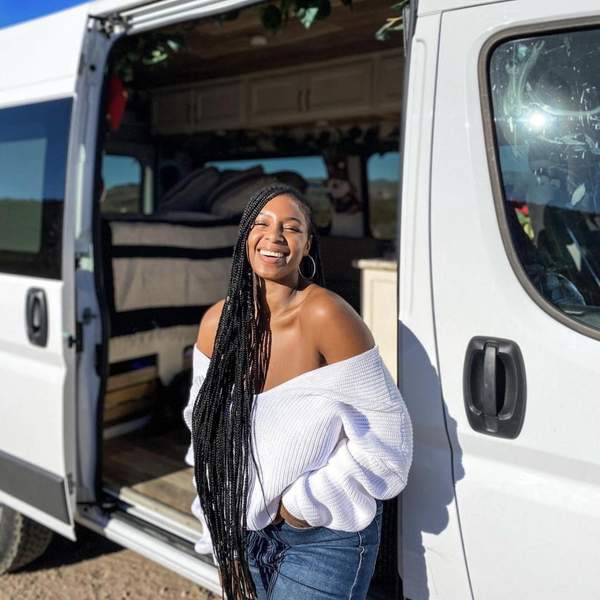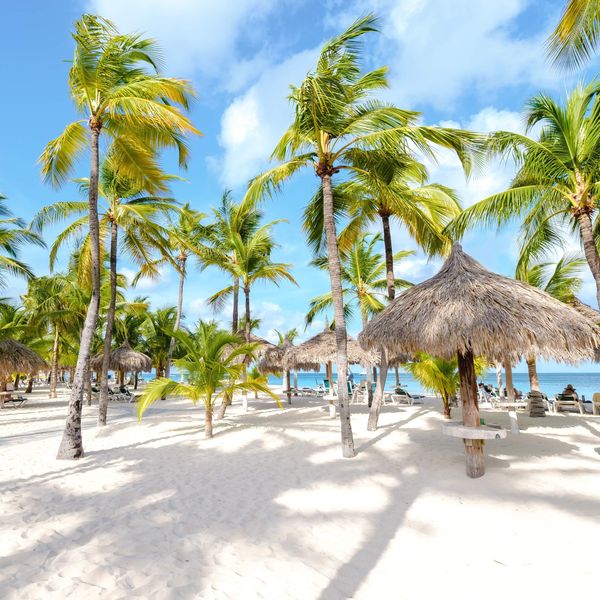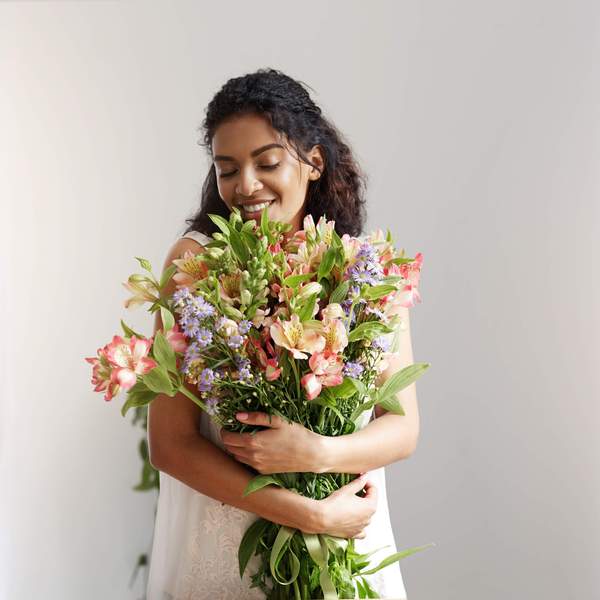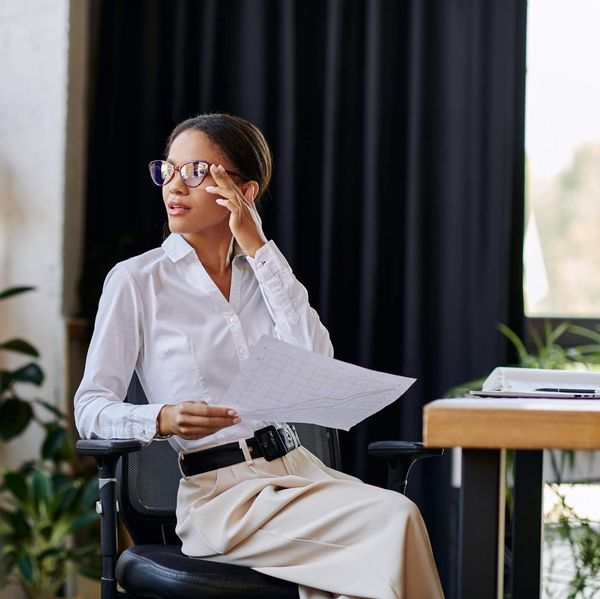I'm a natural-born wanderer. Adventure is my thing. I'd like to think every moment of life is an adventure. I seek it, I crave it, and I need it. It's one drug I will always be addicted to. From horseback riding in Baja Cali, whitewater rafting in the Kern River, riding an ATV in Mexico, hiking in Hawaii, and driving up to the highest mountain peak in Colorado. It's the adrenaline rush for me. Typically, travel fulfills my endless need for adventure. Airports and airplanes excite me. Since the 'Rona, I have opted for short road trips within my home state. And many of us have indulged in cross-country road trips to reduce our FOMO as travel was canceled for most of this pandemic.
BUT what if you can make road trips a lifestyle? Because you absolutely can and it's not a new thing. Men and women have been converting vans into living spaces for decades. From 2017 to 2019, van life has been trending among millennials. If the pandemic showed us anything, it's working remotely, and traveling is more than doable. And more recently, not only has solo female van life emerged, but black women are choosing to live this bohemian lifestyle too. If you search the hashtag #blackvanlife, 5,000 plus photos and videos of melanin poppin' queens and their beautifully remodeled vans in picturesque places across the United States will pop up.
So, what is a van build, you ask? It's when you purchase a van, remove the interior, and convert it into a dope-ass living space. Some van builds include a sink, solar panels, shower, and a toilet. Most van builds are equipped with a bed, table, hidden storage spaces, table, stove, oven, and a mini-refrigerator. It's whatever you want it to be. That's the beauty of it – you make your living space work for you.
xoNecole interviewed five black women on their van builds. Meet these free-spirited black queens and learn what they had to say about the solo female van life below.
Meet the Black Women Living Their Best Lives in Solo Van Builds
1. Candyss Love, 31
Candyss is known as the "Beyonce of Van Life". She travels solo with her German Shepard Cleo. She is a military veteran, police officer, criminal justice instructor, life coach, and entrepreneur. Candyss is an empowered solo female world traveler that traded in fear and trauma for purpose and intentional growth.
2. Paulett Jones, 45
Paulett has spent 26 years in the mental health industry and is now a certified life coach, motivational speaker, and author of Best Secrets Unfold. She is currently studying for her Leadership and Ministry degree and her life's work allows her to change lives with deep compassion and honesty.
3. Natasha Van Horne, 30
Tasha is a full-time EMT/Scheduler Assistant, single mom, and van lifer. When she's not working, wrangling a six-year-old, or improving her van - you can find her out in the wild exploring a new location, or researching a new adventure. Natasha believes that life should be lived to the fullest and that the only things holding us back are ourselves. Her passion is breaking out of her comfort zones and raising her daughter to love nature and challenge herself.
4. Angie Vasquez, mid-forties
Based out of Florida, Angie currently lives in her self-converted van named Parker. Angie is a lover of the outdoors. Nature is her way to keep herself connected to herself and the universe. As an avid explorer who loves to travel and find places off the beaten path, Angie teaches outdoor classes to women. Her passion for nature allowed Angie to start a women's hiking group, Girls Who Hike Florida. Angie's goal is to continue exploring and teaching other women about all the benefits of the outdoors while learning new things traveling in Parker.
5. Antoinette Yvonne, 32
Antoinette Yvonne is an African-American travel and lifestyle content creator, entrepreneur, van lifer, and nomad. Her entertaining vlogs capture the life of a solo female traveler navigating through life in a luxury converted van. Antionette documents her life, showcasing her up and downs equally. She is also the founder of Globally Abroad, a study and travel company committed to providing international opportunities for the minority youth.
The Inspiration Behind the Van Life
Solo female van life is off the beaten path and unconventional AF. The inspiration to convert a van into a living space van varies across the board. Women desire so much more than what society tells us to be. Most women desire their freedom. Other women just love to travel and want to save the coins while doing so. Some women would even refer to van life as a calling or a healing journey. And for women like Angie and Candyss, a van build was a combination of all of the above. It was also a way to cope with their mental health.
Angie: "I dreamed of van life and knew one day I'd find the perfect one for me. I had previously been living in my car to save money for a van and pay off debt. I bought my van Parker in December 2019 and planned to build it out fall of 2020. I was returning to Alaska to work for the summer season when COVID-19 began. My season was canceled, and I had to choose what to do next.
"Like many, I fell into a bit of depression during the lockdown. I needed to find a way out of my funk, I had to regain control of my circumstances. I asked a friend if I could stay with her and I put my car up for sale to fund the build. I figured what better time to build the van than during quarantine. I spent 10 to 12 hour days for the next couple months to build my tiny home on wheels."
Candyss: "As I journey to exploring the depths of myself, healing my emotional past and intentionally choosing to grow, the quest for FREEDOM became extremely loud internally. I realized I had to decide what freedom meant and looked like for ME outside of the societal norms I'd been programmed and conditioned to follow.
"Going to college, getting married and having a baby just haven't been on my priority list and, as a way to honor myself, I gave myself permission to make my own rules and learn what actually makes me feel happy and free. I chose Van Life because it's truly a tool that helps me connect deeper with myself, my growth, and my spirituality."
Lessons Learned During the Van Build Process
Would you be able to do a van build? Easier said than done, right? It's not for everyone; converting a van into a living space is a process. It takes patience, sacrifice, time, money, and a well-thought-out plan. Some women do it themselves and others have their vans custom-built for them. Below, Angie and Tasha share their experience on the solo van conversion experience.
Angie: "The van build was a bit difficult for me because I had no prior building experience. I knew how to get around a few tools, but I'd never really built anything other than an Ikea bookcase or two. I learned many lessons during the build on how to use larger tools like multiple types of saws, drills, and measuring correctly. My biggest lesson was I can do anything I put my mind to. I built 90 percent of the van on my own through trial and error. It gave me the confidence to get out of my comfort zone and try new things.
"As women, we can sometimes sell ourselves short because of confidence. Building the van showed me I was stronger physically and mentally. It allowed me to understand my needs and teach myself that through trial and error amazing things happen."
Tasha: "I learned that that feeling of knowing nothing is EASILY remedied as you begin the process of a build. I watched videos on several builds but as I started mine and had a non-existent budget, I knew I would need to just try my frugal build ideas and see if they worked. Friends gave me leftover wood flooring so I did a lot of googling how to install a wood floor and then adjusting it to how I would need to do it with minimal tools, or money. I learned I can easily up-cycle furniture, and building things is not as hard as it looked. I'm still learning, but I'm less afraid of the process."
The Van Life Chose Me
Van life is not a movement. It's not just a lifestyle either. It's a calling. A true calling that women feel drawn to live. It's not just about freedom, adventure, travel, and saving money. Van life is about honoring yourself and redefining the American dream. It's realizing what matters more in life – happiness, peace, growth, moments, and memories. Antoinette, Paulette, and Tasha reveal their why behind pursuing the van life.
Antoinette: "Unlike many, van life was something that only took one search down the YouTube rabbit hole and I was hooked. Everyone has their reasons of why they want to but it's the adventure and freedom for me. Two weeks after watching my first #vanlife video, I flew down to Georgia to pick up my van. One month later, I drove her over to Ohio to have her outfitted. I love being 'rich in experience' and this lifestyle was an investment that is beyond priceless.
"I also wanted to be challenged. I've traveled all over the world - many times solo (which pushed me out of my comfort zone). I conquered that. And I knew it was time for a new one. I was getting way too comfortable for my liking. Something that I've learned about myself is that I thrive when challenged. I knew van life would push me to greater heights (mentally, physically, and emotionally) and I was right!"
Paulette: "I purchased my school bus in the year 2019, and almost a year later, the pandemic hit, and I wasn't very sure if I was going to take that leap of faith and continue my plans. However, one day my landlord entered my apartment, and I asked him, 'How the pandemic is treating him?' His exact words were, 'I'm going to move to Florida, retire because I don't like the governor of California, and play golf.' I grabbed my pen, added up how much money my landlord received from me in the past four years. I was blown away by the figures, over $70,000.
"In the middle of a pandemic, he's going to golf. I am 45 years old this upcoming March; I said enough is enough. I've been working in the mental health field for 26 years. I have rescued girls from prostituting, attempt suicide, and so much more. I worked 10 hours shifts for rent, ongoing bills, and hustling every day to stay afloat. All to keep up with the American dream that was embedded in me since I was a little girl. I no longer desire the white picket fence and expensive car in the driveway. I desire peace and understanding."
Tasha: "After a hard separation, I wanted to no longer live paycheck to paycheck. I decided to take my financial freedom back, lessen my bills by living full-time in my van, and to choose my future. Finances play a huge part in all of our lives for freedom, and I didn't want to feel obliged to chase money in order to survive. I wanted to stay working as an EMT, and go on amazing adventures with my daughter, and not get pulled further into the rat race as a single momma. My time is everything and I would rather spend it hiking with my daughter, camping, or backpacking than constantly looking for ways to make more money in the future."
Black Girl Van Life
If you search the hashtag #solofemalevanlife, over 10.1 thousand Instagram posts flood your feed. And if you search the hashtag #vanlife, over 9.2 million posts are returned. But the majority of the posts are white women with an inkblot of women of color. It makes me wonder why van life is seen as a lifestyle that only a subset of women can pursue, when the reality is that there are many Black women and other women of color doing the same thing. Candyss, Tasha, and Paulette share their thoughts on why more Black women are choosing the van life.
Candyss: "I believe as melanated beings, we are of the earth and so many black women embarking on the van life journey is a subconscious form of being called to return home into nature, into exploring and finding ways to thrive without the bounds of society and its unrealistic norms.
"I believe black women are taking their power back and giving themselves permission to embody freedom and cultivating safe spaces to decided what freedom actually means, looks, and feels like for them."
Tasha: "I think that a lot more Black women are choosing this lifestyle because they're finally seeing more diversity in van life and realizing it's a very viable option. Van life is like clay - you can mold it however you desire, and financial freedom helps us reach our goals faster or with less stress and debt. I'm excited to see more women of color choosing this life because by doing so, we show the world the possibilities of how richly we can live life in any circumstance."
Paulette: "I believe we have been conditioned to think a certain way and allow others to define what is the American dream and what is success. I feel black women are saying, 'Enough is enough. It's time to live in peace and harmony of who we truly are.' We are creating our own space and our own opportunities to embrace financial freedom and become more for ourselves. We are black women; we are powerful and it's time to live with grace and understand who we are and who we want to become."
Advice for Other Women Considering the Van Life
If you are considering taking that leap and saying goodbye to the stereotypical American life as we know it, now is the time. This pandemic has not ended. More and more women of color are pursuing remote opportunities and entrepreneurship. And the good thing is, we're moving toward a society that allows for it. Angie, Antoinette, and Tasha share words of encouragement for those seeking the van life.
Angie: "The advice I'd give to other women thinking of building a van and living nomadically is research like there's no tomorrow. Buy a notebook and jot down all of the things you want to accomplish by living in a van. Make a list of what you cannot live without, i.e., sink, bathroom, heat, being able to stand up, storage, etc. Watch van build videos and ask questions. The van life community is really open about helping others. Rent an RV or camper van for the weekend to test out the waters. Join a women's group on Facebook and follow other women in vans on Instagram or YouTube. I'd also say you don't have to have the expensive Mercedes Sprinter with all of the upgrades. It isn't all about the expense but the experience."
Antoinette: "First, know your 'why'! Once you have a full understanding of why you want to do a van build or #vanlife, the process becomes easier. From there you'll discover the where, when, and how. Figuring all of that out will make the van build process ten times easier because you'll build your van with all of those components in mind."
Tasha: "The advice I would give to other women wanting to do a van build is to not give too much time to the fears. Start frugal, don't get what you can't afford, and be willing to take the leap. If you don't like it, you can always do something else. Our biggest boundaries are in our minds and we won't know how something will go unless we try it. As you become who you want to be, you start to find more and more people doing it as well and your community will blossom through the journey."
As a fellow solo female traveler and a woman of color, I always say, you never know until you leap. I tell other women who are wanting to travel solo or live a different lifestyle, that the initial fear is always going to be there. But you must choose what you do with this fear.
Are you going to continue to feed this fear or conquer it? Your intuition is your best friend. Trust yourself sis, and watch your life unfold.
Featured image courtesy of candyss.love/Instagram












